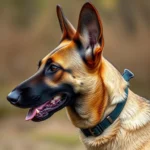
I. Introduction
The world of dog breeds is as diverse as it is fascinating. Each breed has its own unique characteristics, history, and personality traits, making it essential for potential dog owners to understand what they are looking for in a canine companion. Among the many breeds, the Bavarian Mountain Hound stands out as a remarkable choice, known for its loyalty and affection. In this article, we’ll delve deep into the world of dog breeds and explore the specific traits, history, and care requirements of the Bavarian Mountain Hound.
II. Understanding Dog Breeds
A. Definition of Dog Breeds
A dog breed is a specific group of domestic dogs with similar characteristics, behaviors, and appearances that distinguish them from other groups. These characteristics are influenced by genetics, environment, and training. Understanding these traits is crucial as they play a significant role in determining a dog’s behavior, health, and adaptability to various lifestyles.
B. History of Dog Breeds
The domestication of dogs dates back thousands of years, evolving from wolves into various breeds through selective breeding practices. Early humans valued dogs for their hunting, herding, and guarding abilities. Over time, distinct breeds emerged, each tailored for specific tasks, climates, and human needs. This rich history contributes to the diverse range of dog breeds we see today.
III. The Bavarian Mountain Hound
A. Breed Overview
The Bavarian Mountain Hound is a medium-sized breed with a distinctive appearance and an endearing personality. These dogs typically weigh between 50 to 70 pounds and stand about 20 to 25 inches tall at the shoulder. Their short, dense coat often comes in shades of brown, with some dogs displaying a black and tan coloration. Originating from Germany, this breed was primarily developed for tracking and hunting in mountainous terrains.
B. Physical Traits
The physical characteristics of the Bavarian Mountain Hound are striking. They have long, floppy ears that hang close to their cheeks, a strong, muscular build, and a long, tapering tail that is often carried low. Their body is well-proportioned, with a slightly elongated snout and a friendly, intelligent expression. One unique feature is their strong sense of smell, which makes them exceptional scent-tracking dogs.
C. Temperament and Behavior
The Bavarian Mountain Hound is known for its friendly and loyal demeanor. These dogs are affectionate with their families and can be quite protective. They are typically good with children, making them suitable family pets. However, their independent nature means that they can sometimes be stubborn, requiring consistent training. Socialization from a young age is essential to ensure they grow into well-rounded adults.
D. Health and Lifespan
Like all breeds, the Bavarian Mountain Hound is susceptible to certain health issues. Common concerns include hip dysplasia, ear infections, and certain genetic conditions. With proper care, these dogs have an average lifespan of 12 to 14 years. Regular veterinary check-ups, a balanced diet, and an active lifestyle can significantly enhance their longevity.
IV. Care Requirements for Bavarian Mountain Hounds
A. Nutrition
A well-balanced diet is crucial for the health of the Bavarian Mountain Hound. High-quality dog food that meets their nutritional needs is essential. Owners should pay attention to portion control and adjust their dog’s diet based on age, weight, and activity level. Regularly consulting with a veterinarian about dietary needs can ensure optimal health.
B. Exercise Needs
The Bavarian Mountain Hound is an active breed that requires daily exercise to stay healthy and happy. They thrive on activities such as hiking, running, and engaging in interactive games. A minimum of 60 minutes of physical activity each day is ideal. Regular exercise not only keeps them fit but also helps to alleviate boredom and potential behavioral issues.
C. Grooming
Grooming the Bavarian Mountain Hound is relatively straightforward due to their short coat. Brushing them once a week can help remove loose hair and dirt. Bathing should be done as needed, but over-bathing can strip their coat of natural oils. Regular ear checks and nail trimming are also important aspects of grooming to maintain their overall health.
D. Training and Socialization
Early training and socialization are vital for the Bavarian Mountain Hound. Positive reinforcement methods work best with this breed, as they respond well to praise and rewards. Owners should introduce their dogs to various environments, people, and other pets to foster adaptability and reduce anxiety. Consistency and patience during training sessions will yield the best results.
V. Living with a Bavarian Mountain Hound
A. Ideal Living Conditions
The Bavarian Mountain Hound adapts well to different living situations, although they thrive best in homes with ample space. A house with a yard is ideal, as it allows them to roam and play freely. However, they can also adapt to apartment living if given sufficient exercise and mental stimulation.
B. Interaction with Family and Other Pets
These dogs integrate seamlessly into family life, forming strong bonds with their owners. They are generally good with other pets, especially when introduced at an early age. Supervised interactions and gradual introductions can help foster harmonious relationships within a multi-pet household.
C. Common Challenges
While the Bavarian Mountain Hound is a wonderful companion, they may present some challenges. Their independent nature can lead to stubbornness during training. To combat this, owners should remain patient and consistent. Additionally, they may develop separation anxiety if left alone for extended periods. Gradual acclimatization to alone time can help mitigate this issue.
VI. Conclusion
The Bavarian Mountain Hound is a unique and loyal breed that can make a wonderful addition to the right family. Their history as a hunting companion, coupled with their friendly demeanor, makes them an excellent choice for active households. Understanding their care requirements and adapting to their needs can lead to a fulfilling partnership. When considering a new canine companion, the Bavarian Mountain Hound deserves a place on your list.
VII. Additional Resources
A. Recommended Books and Websites
For those interested in learning more about the Bavarian Mountain Hound, numerous books and online resources are available that provide deeper insights into their care and training.
B. Breed Clubs and Organizations
Joining breed-specific clubs can offer support and community for Bavarian Mountain Hound owners, connecting them with experienced breeders and fellow enthusiasts.
C. Contact Information for Veterinarians and Trainers
Establishing a relationship with a veterinarian familiar with the breed can help address health concerns, while professional trainers can provide guidance on effective training methods tailored to the Bavarian Mountain Hound.
This comprehensive exploration of dog breeds, with a focus on the Bavarian Mountain Hound, underscores the importance of understanding individual breed characteristics to ensure a harmonious relationship between dogs and their owners.









